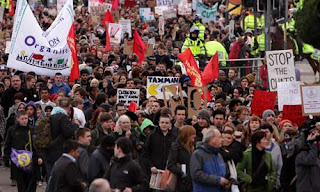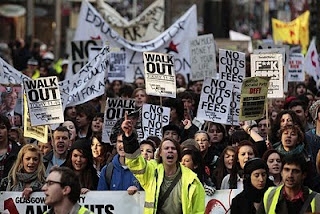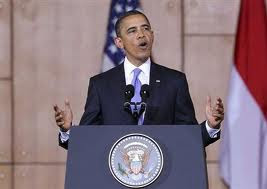Pages
This is a blog for the community of Geography 170: "Geographies of Violence in the Age of Empire" in the Department of Geography at the University of California, Berkeley. This course explores a range of answers to the question: How might geographical thinking be used to critically explore new forms of violence and empire?
Nov 26, 2010
Understanding basics of Nuclear Weapons
I realize that we are nearing the end of the semester, and that extra reading may not be on your ‘to-do’ list… However this website might prove interesting/helpful to understanding some of the basics of WMDs, and in our case nuclear weapons. It is recommended by Professor Muller who teaches “Physics for Future Presidents” which is a really interesting class. It is a lot of information, but I think it could be quite helpful…
http://www.fas.org/nuke/intro/index.html
Nov 24, 2010
solidarity

Photograph: Matt Dunham/AP / November 24, 2010
BLOG
"Second day of student protests - how the demonstrations happened"
Link to news blog at guardian.co.uk
Hi All,
The above is a very interesting blog with live updates on the student tuition hike protests as they unfolded throughout the day in the UK. I am fascinated by the scale of their organization -- much to learn from.


Nov 23, 2010
south korea and north korea
Nov 19, 2010
Quick question about USA-Russia nuke treaty?
Timely Debate Over Surveillance
An interesting very public debate over how far security can justify the public sphere (in this case the TSA) intruding on the private sphere (individual airline passengers) is raging in the media, which has an obvious parallel to Lyon's reading on surveillance.
Lyon's Surveillance Society: Maybe a little over the top?
On page 12, another argument caught my attention, when he links gender, the public and private spheres, and 'private property'. I wasn't sure exactly what he's trying to argue with this, and what its relevance to the rest of the essay was, exactly. Is he saying that women are generally associated with the home, and therefore private property? Or is he mistakenly harking back to times when women were actually considered private property? Either way, I felt that this argument was, if not highly generalized, then actually reinforcing of historical gender roles.
The essay as a whole makes some interesting points, and Lyon is right to point out and criticize the massive way in which information is obtained, distributed, and used in modern times. However, he makes some pretty massive blanket statements and assumptions, that I think generally don't hold up and severely weaken his overall argument.
Also, and more specifically, Lyon seems to both point out, and fall into the trap of technological determinism. throughout the piece, he argues that technology is making our interactions more and more abstract, causing 'disappearing bodies'. I wonder if maybe this argument doesn't fall into the same technologically deterministic trap that he warns about earlier, attributing too much agency to technology in our social interactions. Of course, we would all admit that technology has drastically changed the way we interact with each other and the world, but I'm not convinced it goes quite to the point that Lyon argues. What do you all think?
Nov 18, 2010
UC regents fee hike protest
I think most of us have seen this image and the YouTube videos from Wednesday's protest in San Francisco. Below are links to several news articles as well as photographs of the event that give us some context upon which to reflect. Clearly, it is an outrage and an abuse of power that is frightening, more so because it sets a precedent for how police may respond to moments of tension during future student protests.
ARTICLES
Los Angeles Times:
Huffington Post:
Washington Post:
L.A. Times photography:
Nov 12, 2010
"The Bomb" in the Everyday
This is what I really want to focus on, the normalization of mass destruction and how that influences the way that people deal with it today. A scene that has constantly come back to me over the years is a scene in Hotel Rwanda when the protagonist turns to the American photographer and says that his pictures will bring help to those being massacred because the American people will see them and respond. But the photographer says that no, people will look at them and go back to their TV dinners, never thinking twice. I think that this scene is so poignant to me because it seems so true. But why? Why are we so desensitized to such images? I'm sure many of us in class today looked at those horrendous images of Hiroshima and Nagasaki only to leave the classroom and go have lunch with a friend, take a nap, catch up on your shows on Hulu. I'm not judging you. I do it myself a lot of the time. But again, why is it so easy for us to?
I think these programs have had a lasting effect, not only in how we perceive ourselves in relation to the bomb, but how we perceive its after effects, and moreover, on how we understand and relate to events that result in mass death and destruction. It has become normalized, something that happens all the time, everyday, and naturalized, in that it is a part of the everyday because it is meant to be a part of it, a force of nature, no more preventable than the wind that rustles the trees. (Of course if there was a nuclear apocalypse then there probably wouldn't be any trees to rustle. But I digress.)
Our desensitization, our acceptance of these images and occurrences have had several far reaching and possibly unforeseen effects. But this has no doubt been useful to those pressing the big red button, because if we see the aftermath as something normal and natural that we cannot prevent then opposition to their use has been effectively obliterated, less than the shadows left behind on the bridges of Hiroshima.
Nov 11, 2010
Operation Doorstep 1953 and Operation Cue 1955 Test Films
Nov 10, 2010
today's article in guardian.co.uk
OBAMA'S SPEECH TO THE MUSLIM WORLD CALLS FOR A NEW BEGINNING

In a speech to university students in Jakarta, the US president speaks fondly of his boyhood home and acknowledges that relations are still frayed with the Islamic world. Link to video clip.
Wednesday 10 November 2010 13.15 GMT
White House planners initially considered Indonesia as the location for Barack Obama's much-anticipated speech to the Muslim world, which he eventually gave in Cairo in June last year. Expectations then were probably impossibly high, and his address in Jakarta today did not get the same dramatic billing. Seventeen months on, the mood has soured and polls show that his popularity is in decline across the globe as well as at home...click here to continue to article.
Link to 31:00 minute speech, University of Indonesia, Jakarta
Nov 9, 2010
Classification of land
NY Times article about Afghan women
http://www.nytimes.com/2010/11/08/world/asia/08burn.html?pagewanted=2&_r=1&nl=todaysheadlines&emc=tha1
Nov 7, 2010
The Third Jihad documentary
The Third Jihad
It's a documentary on radical Islam's threat to the US, and has been labeled "propaganda" by many (I would tend to agree). The film follows the same lines as the anti-Muslim Cultural Center advertisements we watched in class, and just the message disseminated in the trailer (which is all I have seen thus far) is terrifying.
The film is put out by the Clarion Fund, which also distributed copies of "Obsession" (comparing Islam to Nazism) in newspapers during the 2008 Presidential Election.
Nov 6, 2010
The Predator War
According to the article by Jane Mayer, there are currently two drone programs in the U.S. The U.S military drone program as an “extension of conventional warfare” in Afghanistan and Iraq and the covert CIA program that targets terrorist internationally. Mayer describes them as “a radically new and geographically unbounded use of state-sanctioned force” and criticizes the CIA’s program specifically for its lack of visibility and accountability.
I feel safe in assuming the general class sentiment is that the current use of drones could have dangerous implications.
I’m curious of the class opinions on if the use of drones is ever acceptable. If so, what would be the conditions of acceptability?
What if we got rid of the CIA program and kept the military one?
What if we could somehow enforce a decrease in the amount of civilian deaths associated with the killings? Is even one civilian death acceptable?
What about the intelligence implications? Are we harming our national security by killing suspects instead of interrogating them? Would it even be possible to locate and capture them instead of killing them?
What are the human rights issues given the opacity of the target list creation? Is it more important that we are able to eliminate the potentially violent treat of the targets being alive?
What are your opinions?
Nov 3, 2010
Friday's Reading
http://search.ebscohost.com/login.aspx?direct=true&db=a9h&AN=44800523&site=ehost-live
